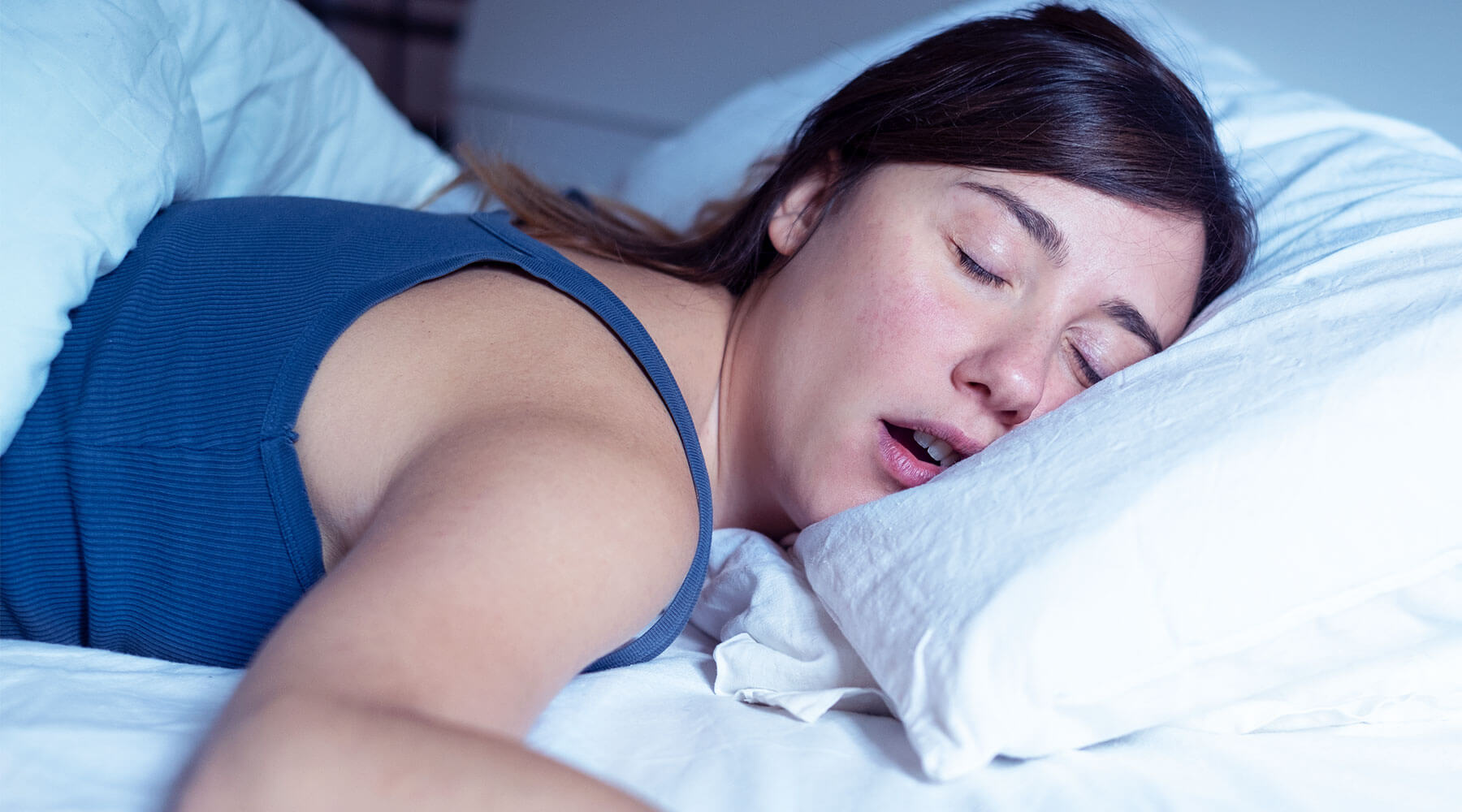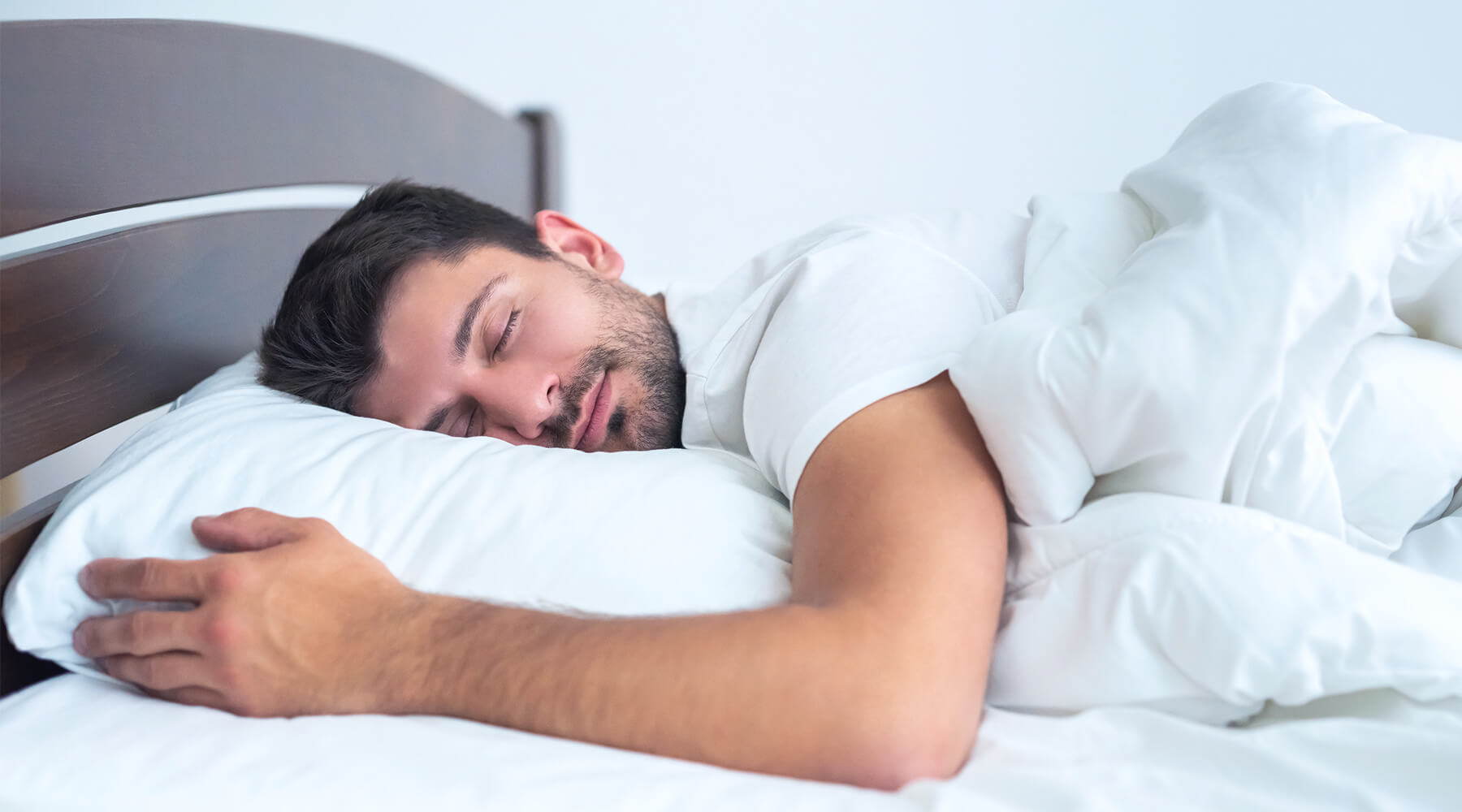
Sleep apnea – pauses in breathing during sleep
Sleep apnea describes the repeated short-term cessation of breathing during sleep and not only disrupts our rest at night, but also damages our health and performance during the day. Here you can find out why nocturnal breathing pauses occur and what you can do to get a restful sleep despite the breathing problems.
Table of contents:
- What is sleep apnea?
- What happens when you have sleep apnea?
- Causes: How does sleep apnea occur?
- Symptoms & consequences of sleep apnea
- Treatment and help for sleep apnea
- Conclusion
Sleep disorders due to irregularities and breathing disorders are widespread and harm not only the duration but also the quality of our sleep. More than 100 million people worldwide suffer from so-called sleep apnea and the consequences of disturbed sleep.
1. What is sleep apnea?
Sleep apnea syndrome is a serious sleep-related breathing disorder and describes the brief cessation of breathing during sleep. Short pauses in breathing, lasting from a few seconds to a few minutes, occur again and again, up to several hundred times a night, and interrupt sleep. Those affected wake up again and again, often completely unnoticed, and suffer from a less than restful sleep. Due to the disturbed breathing, sleep apnea is usually accompanied by pronounced snoring.
2. What happens when you have sleep apnea?
When we breathe healthily, air flows through our nose or mouth and throat and passes easily through the upper respiratory tract. In sleep apnea, on the other hand, the airways are so narrowed or blocked that the resistance is too great and breathing becomes difficult or even impossible.
Stopping breathing causes a drop in the oxygen concentration in the blood and the organs and brain are not supplied with enough oxygen. This puts the body under stress and leads to what is known as an arousal, a reaction in the central nervous system whereupon our brain wakes us up to prevent suffocation in our sleep. In this way, the natural sleep structure is repeatedly interrupted night after night and our sleep no longer provides the much-needed rest.

Snoring vs. Sleep apnea
Snoring, which is actually harmless at first, occurs when the air we breathe encounters resistance due to a narrowing of the airways and we have to breathe out and in more forcefully. The air then flows through the throat at increased pressure and causes the soft tissue (such as the tongue, soft palate or uvula) to vibrate audibly. However, if the airways close even further, no air can pass through the upper airways and sleep apnea, which is harmful to health, occurs.
You can find simple tips against annoying breathing noises and snoring at night in this article.
3. Causes: How does sleep apnea occur?
Depending on the exact cause, a distinction is made between obstructive sleep apnea (OSA) and central sleep apnea (CSA).Obstructive sleep apnea is the most common type of sleep apnea and occurs when the muscles in the upper airways relax during sleep, narrowing and blocking the throat. This happens, for example, due to the natural relaxation of muscles at night, but is also promoted by certain risk factors. In addition to age and certain physical characteristics (narrow airways, small lower jaw or large tonsils), these also include previous illnesses, obesity, smoking or drinking alcohol before going to bed.
The cause of central sleep apnea, on the other hand, is not a proper blockage of the airways and the resulting interrupted airflow, but rather a malfunction of the brain. In central sleep apnea, the brain does not send control signals to the respiratory muscles during sleep, so breathing stops and pauses. However, this form of sleep apnea is less common and only affects about one in ten sleep apnea sufferers.
4. Symptoms and consequences of sleep apnea
Untreated sleep apnea damages the quality of life and, according to studies, also shortens general life expectancy. The inadequate oxygen supply and the disruption of the natural sleep architecture lead to severe daytime tiredness, headaches and forgetfulness, problems with concentration or mood swings in those affected. Due to the disturbed deep sleep, the energy stores in the body and brain cannot be sufficiently filled, resulting in a lack of energy and poor performance.
Frequent awakenings from sleep also repeatedly put the body under stress and place considerable strain on the cardiovascular and nervous systems. This promotes the development of high blood pressure or diabetes, increases the risk of cardiovascular diseases and strokes and the risk of accidents is around three times higher than in people with healthy sleep.
Symptoms of sleep apnea at a glance
Physical consequences |
Psychological consequences |
|
• Headache • Lack of drive and energy • Daytime sleepiness • Increased risk of strokes and diseases of the cardiovascular system • Higher risk of accidents • High blood pressure • Diabetes |
• Difficulty concentrating • Forgetfulness • Nervousness • Mood swings up to depression |
5. Treatment & help against sleep apnea
In the case of obstructive sleep apnea, the aim of treatment is of course to prevent a narrowing and eventual blockage of the upper airways so that air can pass through the throat and flow easily into the lungs even during sleep. Which is the best method to avoid breathing pauses basically depends on the individual cause. In milder cases, it can help to minimize typical risk factors. For example, you can avoid alcohol and smoking, control excess weight and support a healthy sleeping posture with the help of a suitable pillow. In more severe cases, the use of special sleep masks or bite splints, which open the airways and allow you to breathe freely during sleep, has proven effective.
Unlike snoring, sleep apnea is a serious illness. Anyone who suffers from nocturnal breathing pauses should definitely seek advice from a doctor and seek professional help in order to improve their own health and sleep in the long term.
6. Conclusion
-
Sleep apnea is a common breathing-related sleep disorder and refers to the repeated occurrence of pauses in breathing during sleep.
-
Sleep apnea disrupts sleep, damages daily performance and has numerous negative health consequences such as an increased risk of cardiovascular disease, high blood pressure or diabetes.
Greetings and see you soon!




Leave a comment
This site is protected by hCaptcha and the hCaptcha Privacy Policy and Terms of Service apply.